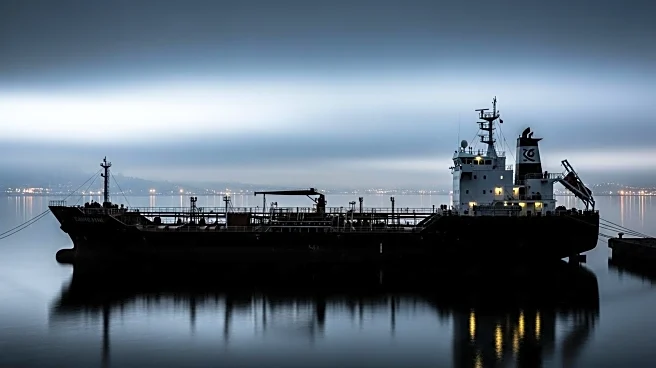What's Happening?
French police have detained the captain and first officer of the Boracay, a tanker suspected of being part of Russia's 'shadow fleet.' The arrests followed a boarding operation by the French navy, which took place after the vessel was involved in drone incidents near Denmark. The Boracay, sanctioned by Britain and the EU, left the Russian port of Primorsk on September 20. French authorities have extended the detention of the crew members, who are accused of failing to provide proof of the vessel's nationality and not complying with orders. President Emmanuel Macron has expressed support for the investigation, noting the significance of Russia's shadow fleet, estimated to comprise 600 to 1,000 ships.
Why It's Important?
The arrest of the Boracay's crew highlights ongoing international efforts to address the activities of Russia's shadow fleet, which plays a crucial role in Moscow's economic strategy. This fleet is believed to facilitate the transport of goods under sanctions, thereby undermining international sanctions regimes. The investigation could lead to increased pressure on Russia and potentially disrupt its maritime operations. The incident also underscores the geopolitical tensions in Europe, particularly in relation to Russia's activities in the region. The outcome of this investigation may influence future diplomatic and economic policies between European nations and Russia.
What's Next?
French authorities are expected to continue their investigation into the Boracay and its crew, potentially leading to further legal actions. The probe may also prompt other European countries to scrutinize vessels suspected of being part of Russia's shadow fleet. Additionally, there could be diplomatic repercussions, with European nations possibly coordinating more stringent measures against Russian maritime activities. The situation may also lead to increased surveillance and security measures in European waters to prevent similar incidents.
Beyond the Headlines
The arrest of the Boracay's crew raises broader questions about maritime security and the effectiveness of international sanctions. It highlights the challenges faced by countries in enforcing sanctions and monitoring illicit activities at sea. The incident may prompt discussions on enhancing international cooperation and intelligence sharing to better address such issues. Furthermore, it could lead to debates on the ethical implications of using shadow fleets to circumvent sanctions, potentially influencing future policy decisions.










